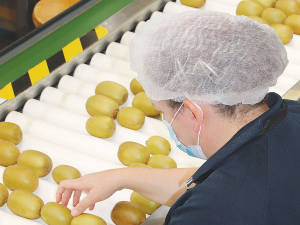MPI Hails Kiwifruit Boom as Horticulture Revenue Surges Past $9 Billion
Ministry for Primary Industries (MPI) Director General Ray Smith is giving a big shout-out to the horticulture sector, especially kiwifruit.
 Zespri chief executive Dan Mathieson says quality of kiwifruit for the coming season is looking good.
Zespri chief executive Dan Mathieson says quality of kiwifruit for the coming season is looking good.
The quality of kiwifruit for the coming season is looking good.
That's the view of Zespri's chief executive Dan Mathieson. He told Hort News that while there's been a slight delay to the start of the picking season, they are seeing a lot of good quality fruit sizes coming through. But he adds that due to last year's October frost - and to some extent, Cyclone Gabrielle - the 2023 crop will be lower than last season.
"We think it will be in the order of between 15% and 20%," he says.
Mathieson says a huge effort is being made to ensure that fruit quality in 2023 is back to where it should be. He says there is an industry wide response plan to the problem to deal with the issue and all those in the supply chain are cooperating fully.
"This relies on growers making sure that the fruit is coming off the vine into bags in the way it should," he told Hort News.
"Our post-harvest sector is managing the quality well through packing process and Zespri ensuring that the fruit gets out to our customers in the best possible condition. Also, the shipping people managing the condition of the fruit on our vessels to ensure that when it gets to market, it's ready to go and ready to eat state," he adds.
Last season, poor quality fruit cost the kiwifruit sector about $500 million dollars. But worse still, it caused considerable adverse reaction from buyers of our fruit and Zespri was a put on a warning to sort the quality issue out pronto.
Mathieson says Zespri's research shows that one of the main reason for the drop in quality was the shortage of people to pick the fruit, remembering this took place in the middle of a major Covid outbreak compounded by a lack of overseas workers. He says the industry at the time was short of about 7,000 workers and those picking the fruit were under pressure.
"So, we saw a lot of damage coming from picking. A lot of that fruit was going into the bins too quickly, that was creating bruising and physical damage and that was taking about five weeks to show through," he explains.
"Then we started to find that in-market, and we were having to repack a lot of that fruit. As we got into the season, we started to realise the scale of the problem and we began repacking fruit in our packhouses here before it left for market."
Voting has started for the renewal of DairyNZ's milksolids levy.
The most successful catchment groups in NZ are those that have 'a source to sea' approach.
Associate Agriculture Minister and Manawatu dairy farmer Andrew Hoggard says the free trade agreement (FTA) negotiated with India is not a bad deal and his party, Act, will support it when it goes before Parliament.
Newly released data from Environment Canterbury (ECan) Farm Environment Plan (FEP) audits are showing a dramatic lift in environmental performance across the region.
A solid recovery of global dairy prices this year makes a $9.50/kgMS milk price almost a shoo-in for this season.
As New Zealand marks the United Nations’ International Year of the Woman Farmer 2026 (IYWF 2026), industry leaders are challenging the misconception that women only support farming.

OPINION: Here w go: the election date is set for November 7 and the politicians are out of the gate…
OPINION: ECan data was released a few days ago showing Canterbury farmers have made “giant strides on environmental performance”.